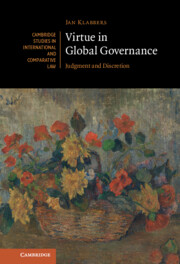Book contents
- Virtue in Global Governance
- Cambridge Studies in International and Comparative Law: 170
- Virtue in Global Governance
- Copyright page
- Dedication
- Contents
- Preface
- 1 Introduction
- 2 Ethical Challenges
- 3 The Individual in Global Governance
- 4 Virtue Ethics and Global Governance
- 5 On Virtue and Law
- 6 Operationalizing Virtue
- 7 Understanding Governance
- 8 Defining Governance
- 9 Evaluating Governance
- 10 Epilogue
- Bibliography
- Index
- Cambridge Studies in International and Comparative Law
5 - On Virtue and Law
Published online by Cambridge University Press: 28 July 2022
- Virtue in Global Governance
- Cambridge Studies in International and Comparative Law: 170
- Virtue in Global Governance
- Copyright page
- Dedication
- Contents
- Preface
- 1 Introduction
- 2 Ethical Challenges
- 3 The Individual in Global Governance
- 4 Virtue Ethics and Global Governance
- 5 On Virtue and Law
- 6 Operationalizing Virtue
- 7 Understanding Governance
- 8 Defining Governance
- 9 Evaluating Governance
- 10 Epilogue
- Bibliography
- Index
- Cambridge Studies in International and Comparative Law
Summary
The intellectual historian John Pocock once observed that with the rise of commercialization, the status of citizens was no longer seen as a function of their actions and their virtues but came to be constructed in juridical terms, in terms of rights and of ownership of things. He posits an opposition between virtue (part of a political way of life) and rights (part of a commercial way of life) that was eventually bridged with the help of the social notion of manners – and this might help explain why we associate the virtue of prudence with a certain kind of prudishness.
- Type
- Chapter
- Information
- Virtue in Global GovernanceJudgment and Discretion, pp. 124 - 149Publisher: Cambridge University PressPrint publication year: 2022

